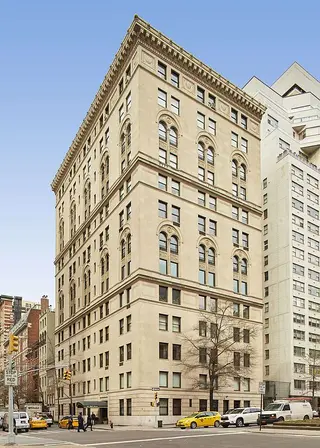 Carter Horsley
Carter HorsleyDec 23, 2011
Carter's Review
One of Park Avenue’s more exclusive apartment buildings with only one unit per floor, this 13-story, limestone-clad building at 640 Park Avenue on the northwest corner at 66th Street was erected in 1914 and converted to a co-operative in 1946.
It was designed by J. E. R. Carpenter, the leading architect of luxury apartment buildings in the city of his generation. His other Park Avenue buildings include 550, 580, 625, 630, 635, 655, 812, 950, 960 and 1050. His Fifth Avenue buildings include 810, 825, 907, 920, 950, 988, 1030, 1035, 1060, 1115, 1120, 1143, 1150, 1165 and 1170 as well as 2 East 66th Street.
The building, which has a very impressive side-street entrance, was developed by Spencer Fullerton Weaver and replaced six row houses. Mr. Weaver also developed 630 Park Avenue.
Bottom Line
One of reasons why Park Avenue is a very prestigious address. This building’s got a great cornice, a wormy façade and a fine location.
Description
The limestone-clad building has a one-story rusticated limestone base with string courses above the first, 4th, 8th and 12th floors and bandcourses above the 5th and 9th floors.
There are paired arched windows on the 7th and 11th floors.
The building is distinguished by its narrow but highly detailed and very crisp cornice.
The building has protruding air-conditioners.
In his December 29, 2011 “Streetscapes” column in The New York Times, Christopher Gray noted that “there is one aspect of Weaver’s creation that any sidewalk Johnny can enjoy: its limestone façade.”
“Close attention,” he wrote, “will be amply repaid by the sight of shells, worm burrows, spirals, cups and animal tracks, a sedimentary ‘call of the wild’ of the Mississippian, the time in which the remains of marine animals were crushed and solidified. The finest one is at chest height, all the way north on Park Avenue. Standing back on the sidewalk, you can see great wavy bedding patterns making their way across the large blocks, the traces of the soft seas that covered the middle of the United States long ago. Anyone, whether in the top or bottom 1 percent, can rub a hand across the lightly flaking sand and fossils.”
Mr. Gray’s eye-sight is without peer, at least architecturally.
Amenities
The building has a doorman.
Apartments
Some of the apartments have as many as 18 rooms and most have cedar closets and fireplaces and Brazilian walnut floors.
The 8th floor unit has five bedrooms and a 25-foot-wide entrance gallery with a fireplace that leads to a 25-foot-wide dining room with a fireplace, a 20-foot-wide reception room, a 25-foot-wide living room with a fireplace, and a 20-foot-wide library with a fireplace. The master bedroom also has a fireplace and there is an 18-foot-long pantry, and eat-in kitchen and an 18-foot-long breakfast room and two staff rooms, and a wine closet. This apartment was sold for $23 million in August, 2013 by the estate of Sue Erpf Van de Bovenkamp, the widow of Armand Erpf, a financier. She was a former model for the House of Valentino and appeared in several films included “La Dolce Vita.”
History
Mr. Gray noted in his column that “Weaver’s first tenants were among New York’s comfortably rich, people like George and Herbert Pratt, who were deserting the family enclave that their father, Charles, a partner in Standard Oil, had created on Clinton Avenue in Brooklyn,”
Other residents have included Evelyn Annenberg Jaffe Hall and a current resident is Millard S. Drexler, the head of J. Crew.
In 2009, Richard S. Fuld Jr., sold his apartment for more than $25 million to Glenn Fuhrman, a co-founded of MSD Capital, the investment vehicle for Michael S. Dell, the founder of Dell Computers. Mr. Fuld was the former chief executive of Lehman Brothers.
Mr. Gray also observed that “it is when you go pre-prewar – that is, before World War I – that you get to the richest lode of apartment luxury.” “That could be anything from the Dakota (1884) to 998 Fifth Avenue (1912), in part because they were designed before experience taught developers how to cut corners. On Park Avenue one of the most remarkable of these structures is No. 640,” Mr. Gray wrote.
Location
This section of Park Avenue is very desirable because it has several very handsome low-rise buildings, churches and landmarks that make it architecturally quite interesting and also provides more open views. This building is across the avenue from the imposing and impressive 7th Regiment Armory. It is also convenient to public transportation and the many fashionable boutiques and restaurants along Madison Avenue and, of course, it is not too far from Central Park.

- Co-op built in 1914
- Located in Park/Fifth Ave. to 79th St.
- 13 total apartments 13 total apartments
- 9 recent sales ($7M to $25.9M)
- Doorman
 6sqft delivers the latest on real estate, architecture, and design, straight from New York City.
6sqft delivers the latest on real estate, architecture, and design, straight from New York City.
